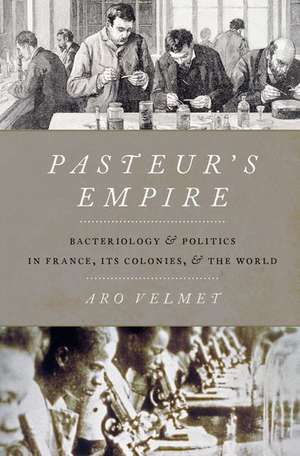Pasteur's Empire: Bacteriology and Politics in France, Its Colonies, and the World
Autor Aro Velmeten Limba Engleză Hardback – 20 feb 2020
Preț: 512.42 lei
Preț vechi: 588.70 lei
-13% Nou
Puncte Express: 769
Preț estimativ în valută:
98.07€ • 101.87$ • 81.46£
98.07€ • 101.87$ • 81.46£
Carte disponibilă
Livrare economică 01-07 ianuarie 25
Preluare comenzi: 021 569.72.76
Specificații
ISBN-13: 9780190072827
ISBN-10: 0190072822
Pagini: 324
Ilustrații: 16 illustrations and 3 maps
Dimensiuni: 163 x 246 x 31 mm
Greutate: 0.66 kg
Editura: Oxford University Press
Colecția OUP USA
Locul publicării:New York, United States
ISBN-10: 0190072822
Pagini: 324
Ilustrații: 16 illustrations and 3 maps
Dimensiuni: 163 x 246 x 31 mm
Greutate: 0.66 kg
Editura: Oxford University Press
Colecția OUP USA
Locul publicării:New York, United States
Recenzii
With his Pasteur's Empire, Aro Velmet makes an undeniably useful contributionto such a history.
French Colonial Historical Society's Alf Andrew Heggoy Prize Honorable Mention
Velmet explores the colonial past of global health. He shows how the disciples of Louis Pasteur found in the French colonies a space of opportunity, where their techniques and knowledge could help 'fix' the Empire. Solid and accessible, Velmet's Pasteur's Empire demonstrates that medical history can be both theoretically ambitious and significant for our present.
This superb book moves beyond the narrow confines of the immediate legacy of Pasteur and others following his approach. The research is thorough and draws on a wealth of original archival material in addition to published sources. Pasteur's Empire is an engaging and important contribution to the history of bacteriology and its relationship with Empire.
One of the great contributions of Pasteur's Empire is to show how the action of these famous bacteriologists attached to the Pastorian school gave rise to tensions and even rivalries.
Pasteur's Empire casts new light on a number of aspects of the history of the Pasteur Institute. The book, however, gives an oversimplified and one-dimensional portrait of a complex history. An appraisal of the role the Pasteur Institute played in the making of the French colonial empire requires a more in-depth study of the much richer and articulated history of the Institute and of its researchers, including the fact that microbiology changed profoundly between the 1930s and the 1960s with the "molecular revolution." It also requires an in-depth engagement with the historiography of modern France and of modern empires.
French Colonial Historical Society's Alf Andrew Heggoy Prize Honorable Mention
Velmet explores the colonial past of global health. He shows how the disciples of Louis Pasteur found in the French colonies a space of opportunity, where their techniques and knowledge could help 'fix' the Empire. Solid and accessible, Velmet's Pasteur's Empire demonstrates that medical history can be both theoretically ambitious and significant for our present.
This superb book moves beyond the narrow confines of the immediate legacy of Pasteur and others following his approach. The research is thorough and draws on a wealth of original archival material in addition to published sources. Pasteur's Empire is an engaging and important contribution to the history of bacteriology and its relationship with Empire.
One of the great contributions of Pasteur's Empire is to show how the action of these famous bacteriologists attached to the Pastorian school gave rise to tensions and even rivalries.
Pasteur's Empire casts new light on a number of aspects of the history of the Pasteur Institute. The book, however, gives an oversimplified and one-dimensional portrait of a complex history. An appraisal of the role the Pasteur Institute played in the making of the French colonial empire requires a more in-depth study of the much richer and articulated history of the Institute and of its researchers, including the fact that microbiology changed profoundly between the 1930s and the 1960s with the "molecular revolution." It also requires an in-depth engagement with the historiography of modern France and of modern empires.
Notă biografică
Aro Velmet is Assistant Professor of History at the University of Southern California.
